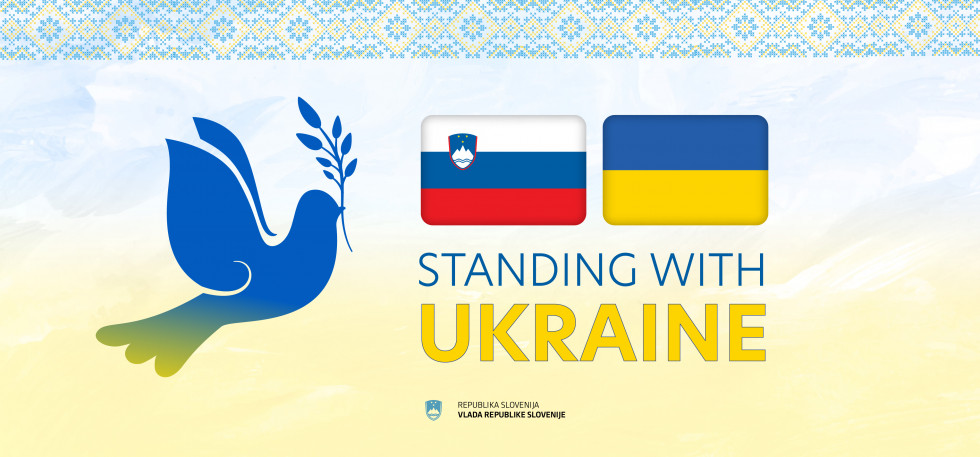Slovenia: We remain in solidarity with Ukraine
The 24th February marks the one-year anniversary of the Russian invasion of Ukraine. During this year, the Ukrainian people have shown extraordinary will and determination not to submit to Russia and its demands over parts of Ukrainian territory, despite the high price they pay for this every day.
Unified political support
The European Union and NATO have reacted with one voice to the situation, showing full solidarity with Ukraine and its people. Slovenia has been and remains a strong supporter of Ukraine. We have supported Ukraine's position as a candidate for membership of the European Union and all the sanctions packages adopted so far against Russia and Belarus.
The Slovenian Government has strongly condemned Russia's aggression against Ukraine, in particular the attacks on civilians and the destruction of important critical infrastructure, and has called on Russia to stop such actions immediately. Slovenia joined Ukraine's case against the Russian Federation for violations of the Convention on the Prevention and Punishment of the Crime of Genocide before the International Court of Justice in The Hague. In this context, Slovenia especially draws attention to the call for accountability for war crimes and the plight of children and women. Slovenia is also among the original co-sponsors of the UN resolution on principles underlying a comprehensive, just and lasting peace in Ukraine.
Humanitarian, material and military assistance to Ukraine
Slovenia's immediate response to the Ukraine crisis included humanitarian and material assistance. In the first months after the attack, Slovenian citizens collected humanitarian and material aid through municipalities and local communities, and, with the help of the Administration of the Republic of Slovenia for Civil Protection and Disaster Relief and international humanitarian organisations, delivered it to Ukraine and to Ukrainian refugees in other countries. Companies, pharmacies, health care institutions, medical equipment wholesalers, ministries and government departments also participated in the collection of aid. Humanitarian aid is also an important part of Slovenia's assistance to Ukraine, which Slovenia as a country provides at donor conferences, through international organisations or in the form of bilateral projects (the ITF project to assist refugees in Moldova and Slovenia, and the Caritas Slovenia’s project to assist refugees in Poland and Moldova).
Slovenia is also contributing to Ukraine's defence capabilities, and among other things, donated 35 M80A infantry fighting vehicles and 28 M-55S tanks, which is enough equipment for one mechanised and one armoured battalion.
Assistance to Ukrainian refugees in Slovenia
More than 8 million people have fled their homes since the start of the Russian attack on Ukraine. Just over 70,000 have registered their residence in Slovenia, while 7,963 Ukrainian refugees have been granted temporary protection status this year.
All Ukrainian citizens with temporary protection status are entitled to temporary residence, accommodation and food in accommodation centres or financial assistance for private accommodation, healthcare, work, education, cash or pocket money, family reunification, etc. The Government Office for the Support and Integration of Migrants organised accommodation for migrants in three accommodation centres, student hostels, integration houses and apartments, thus providing 529 beds. Of the 5,477 applications for financial assistance and 4,744 applications for financial assistance for private accommodation, the Government Office approved 90.5 per cent of the applications. The Initial Integration Programme (learning Slovenian language, history and culture) involves 445 Ukrainian refugees. Slovenia has thus allocated €20.5 million for the care and integration of Ukrainian refugees in one year.
Ukrainian refugees are also integrated into the Slovenian labour market. Currently, 450 people from Ukraine are registered as unemployed and 101 have already found a job within a year of their arrival in Slovenia.
There is a call centre (080 41 42) to help with information and a website, Support for Ukrainian Nationals in Slovenia, which also includes content in Ukrainian.
Ensuring young people get their lives back to normal as quickly as possible
Slovenia pays special attention to young people, children and adolescents, and takes various measures to ensure that their lives return to a predictable path as soon as possible: so they can socialize with their peers, go to kindergarten, attend classes. There are 244 pre-school children in Slovenian kindergartens, and just over nine hundred children in primary school in the area where they live. To help them integrate into their new environment, the state provides them with additional Slovenian language lessons, textbooks from school funds and free school meals and transport. One hundred young people are currently studying in secondary schools. Slovenian universities are also actively helping Ukrainian students to integrate comfortably into their new environment and continue their education. This school year, 164 Ukrainian citizens have enrolled for the first time in study programmes, out of the total 227 enrolments. Ukrainian students have the same rights as Slovenian and EU citizens, can benefit from subsidised accommodation in student halls of residence, and universities organise Slovenian language courses. The Slovenian Student Union also has an INFO Point.
Helping the most vulnerable
At the request of the Embassy of Ukraine, Slovenia successfully relocated children from the Luhansk Orphanage, the only project of its kind in Slovenia so far. In a wide-ranging cooperation between the Government Office for the Support and Integration of Migrants, the Municipality of Postojna, the local community, Civil Protection, Postojna Student Dormitory, Association of Friends of Youth, the Pop TV media company and various individuals, the local adult education centre in Slavina became home to twenty orphan children.
Slovenia also responded to Ukraine's request for medical care for the wounded and took in two Ukrainian wounded persons. It thus joins the other 18 EU countries which are providing care for the wounded and sick from Ukraine.


